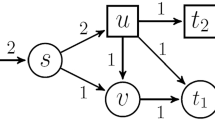Abstract
We introduce the path player game, a noncooperative network game with a continuum of mutually dependent set of strategies. This game models network flows from the point of view of competing network operators. The players are represented by paths in the network. They have to decide how much flow shall be routed along their paths. The competitive nature of the game is due to the following two aspects: First, a capacity bound on the overall network flow links the decisions of the players. Second, edges may be shared by several players which might have conflicting goals. In this paper, we prove the existence of feasible and pure-strategy equilibria in path player games, which is a nontrivial task due to noncontinuity of payoff functions and the infinite, mutually dependent strategy sets. We analyze different instances of path player games in more detail and present characterizations of equilibria for these cases.
Similar content being viewed by others
References
ARRIVAL: Algorithms for robust and online railway optimization: improving the validity and reliability of large scale systems. Funded by the “Future and Emerging Technologies” Unit of the EC within the 6th Framework Programme of the European Commission, http://arrival.cti.gr/.
Anshelevich E, Dasgupta A, Kleinberg J, Tardos É, Wexler T, Roughgarden T (2004) The price of stability for network design with fair cost allocation. In: Proceedings of FOCS04, pp 295–304
Archer A, Tardos É (2002) Frugal path mechanisms. In: Proceedings of the 13th Annual ACM-SIAM symposium on discrete algorithms, ACM, New York, pp 991–999
Bramoullé Y, López-Pintado D, Goyal S and Vega-Redondo F (2004). Network formation and anti-coordination games. Int J Game Theo 33(1): 1–19
Correa JR, Schulz AS and Stier Moses NE (2004). Selfish routing in capacitated networks. Math Oper Res 29(4): 961–976
Czumaj A, Krysta P, Vöcking B (2002) Selfish traffic allocation for server farms. In: Proceedings of STOC02, pp 287–296
Devanur N, Garg N, Khandekar R, Pandit V, Saberi A, Vazirani VV (2005) Price of anarchy, locality gap, and a network service provider game. In: Proceedings of WINE05, pp 1046–1055
Elkind E, Sahai A, Steiglitz K (2004) Frugality in path auctions. In Proceedings of the 15th annual ACM-SIAM symposium on discrete algorithms. ACM, Newyork, pp 701–709
Fabrikant A, Luthra A, Maneva E, Papadimitriou CH, Shenker S (2003) On a network creation game. In: Proceedings of the 22th annual symposium on Principles of distributed computing, pp 347–351
Facchinei F and Pang J-S (2006). Exact penalty functions for generalized Nash problems. In: Di Pillo, G and Roma, M (eds) Large-scale nonlinear optimization, pp 115–126. Springer, New York
Fudenberg D and Tirole J (1991). Game theory. MIT Press, Cambridge
Goh CJ and Yang XQ (1999). Vector equilibrium problem and vector optimization. Eur J Oper Res 116: 615–628
Gómez D, González-Arangüena E, Manuel C, Owen G, del Pozo M and Tejada J (2003). Centrality and power in social networks: a game theoretic approach. Math Soc Sci 46: 27–54
Goyal S and Vega-Redondo F (2005). Network formation and social coordination. Games Econ Behav 50: 178–207
Grofman B and Owen G (1982). A game theoretic approach to measuring degree of centrality in social networks. Soc Netw 4(3): 213–224
Harker PT (1991). Generalized nash games and quasi-variational inequalities. Eur J Oper Res 54: 81–94
Jackson MO (2005). Allocation rules for network games. Games Econ Behav 51: 128–154
Johari R and Tsitsiklis JN (2004). Efficiency loss in a network resource allocation game. Math Oper Res 29(3): 407–435
Kelly F (1997). Charging and rate control for elastic traffic. Eur Trans Telecommun 8: 33–37
Monderer D and Shapley LS (1996). Potential games. Games Econ Behav 14: 124–143
Owen G (1995). Game theory. Academic, San Diego
Puerto J, Schöbel A, Schwarze S (2006) A class of infinite potential games. Technical Report 2006-15. Institut für Numerische und Angewandte Mathematik, Universität Göttingen (Preprint Reihe)
Puerto J, Schöbel A, Schwarze S Games on polyhedra. Working paper
Roughgarden T (2005). Selfish routing and the price of anarchy. MIT Press, Cambridge
Schöbel A (2006). Customer-Oriented optimization in public transportation. Springer, New York
Schöbel A, Schwarze S (2006a) A game-theoretic approach to line planning. In: Proceedings of ATMOS06, Zurich. http://drops.dagstuhl.de/opus/volltexte/2006/688
Schöbel A, Schwarze S (2006b) Dominance and equilibria in the path player game. In: Proceedings of OR2005, pp 489–494
Schwarze S (2006) Path Player Games: Analysis, generalization and application. PhD Thesis, University of Göttingen
Vetta A (2002) Nash equilibria in competitive societies, with applications to facility location, traffic routing and auctions. In: Proceedings of FOCS02, pp 416–425
Author information
Authors and Affiliations
Corresponding author
Rights and permissions
About this article
Cite this article
Puerto, J., Schöbel, A. & Schwarze, S. The path player game. Math Meth Oper Res 68, 1–20 (2008). https://doi.org/10.1007/s00186-007-0188-3
Received:
Revised:
Published:
Issue Date:
DOI: https://doi.org/10.1007/s00186-007-0188-3




